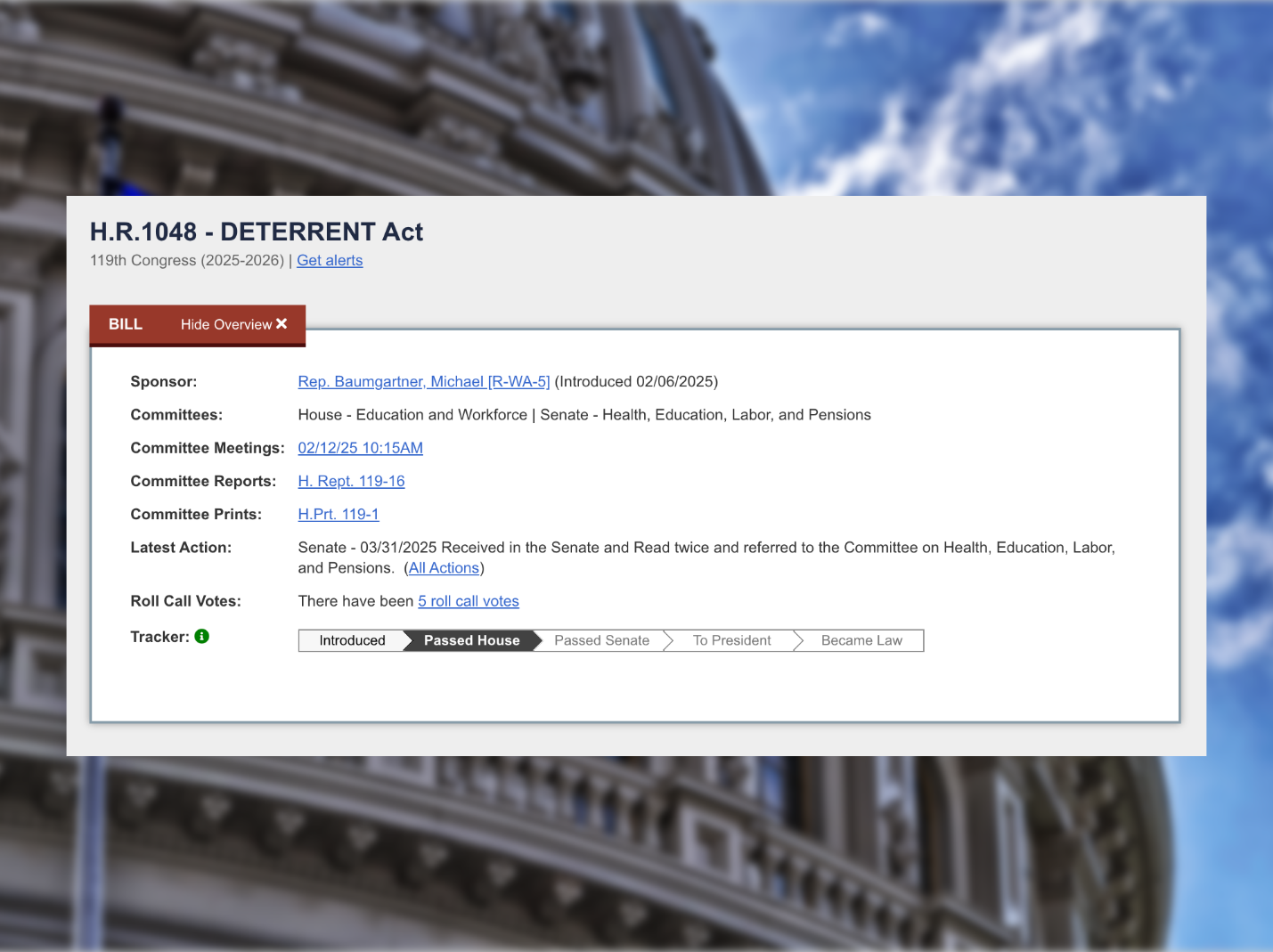
Author’s Note: This article is from my weekly “Top of Mind” email, sent to subscribers every Thursday. For more content like this and to receive the full newsletter each week, enter your name and email under “SIGN UP FOR OUR WEEKLY NEWSLETTER, ‘TOP OF MIND,’” located on the right-hand side of the site.
It was welcome news last week that the U.S. House of Representatives passed H.R. 1048, the “Defending Education Transparency and Ending Rogue Regimes Engaged in Nefarious Transactions” (DETERRENT Act). Introduced on February 6 by Rep. Michael Baumgartner (R-WA), the bill aims to counter malign foreign influence in U.S. colleges and universities by amending Section 117 of the 1965 Higher Education Act. It lowers the foreign gift reporting threshold from $250,000 to $50,000—and to $0 for “Countries of Concern” such as China, Russia, and Iran. Given the well-documented foreign entanglements of U.S. universities, this bill deserves broad support.
I write to you today just a few miles from the University of Pennsylvania, which, only two years ago, was found to have deep financial ties to China—ties that grew after the Penn Biden Center’s launch in 2017. Between 2018 and 2023, Penn received nearly $130 million from Chinese sources, including tens of millions in anonymous donations. But Penn is no outlier—many U.S. universities have accepted millions from foreign governments, including adversarial ones.
The National Association of Scholars’s Shadows of Influence report exposed Qatar as one of the most influential foreign funders in American higher education. For over two decades, Qatar funneled billions into U.S. universities and think tanks.
No doubt, funding from such foreign nations compromises academic freedom.
For Qatar, universities aligned themselves with its authoritarian interests, including advancing the ideology of the Muslim Brotherhood, which backs Hamas. China’s influence has been even more dangerous. As Ian Oxnevad recently reported, UC Berkeley’s ties to the Chinese Communist Party grant Beijing open access to American policymakers, dual-use technologies, and opportunities to deploy soft power tools to undermine our national security and national cohesion.
Though UC Berkeley shut down the Tsinghua-Berkeley Shenzhen Institute after failing to disclose $87 million in Chinese funds, Oxnevad says, its California-China Climate Institute—established under California law in 2021—still collaborates with Tsinghua University. Chaired by former Governor Jerry Brown, the institute promotes policies like EV mandates—conveniently benefiting China as the dominant supplier of rare-earth minerals—while undermining U.S. energy independence.
The DETERRENT Act could help curb these threats by mandating compliance officers, closing reporting loopholes, and shifting oversight to agencies such as the IRS and the Financial Crimes Enforcement Network.
But education reformers should hold off on celebrating—deterring malign foreign influence is a marathon, not a sprint.
For one, the bill has yet to pass the Senate, where lawmakers could water it down into a nothingburger—they’re quite good at that. And even if it does pass, laws are only as strong as the willingness to enforce them. Under the current administration, we’re likely to see real action—but a future left-wing administration could simply ignore foreign influence, just as the Biden White House did.
Passing this bill gets us closer to the finish line, but the race is far from over. Without consistent pressure, it could become yet another rule universities break with impunity.
Follow Jared Gould on X.
Cover designed by Jared Gould using an image of the Capitol Building by Andrea Izzotti on Adobe Stock; Asset ID#: 174806108 & Screenshot of H.R.1048 – DETERRENT Act on Congress.gov

On a related note, there is this: https://apnews.com/article/chinese-beijing-honeypot-spies-diplomat-agent-intelligence-c077ef57b0f7ae43dd0db41bea92238b
“Intelligence services across the world have long used attractive men and women to obtain sensitive information, famously during the Cold War. The State Department and other agencies with offices in China have long had stringent reporting requirements on personal relationships for American personnel stationed there, as well as rivals considered high intelligence threats such as Russia or Cuba.
Declassified State Department documents show that in 1987, the U.S. government barred personnel stationed in the Soviet bloc and China from befriending, dating or having sex with locals after a U.S. Marine in Moscow was seduced by a Soviet spy. Such restrictions were relaxed after the collapse of the Soviet Union in 1991, according to news reports at the time.”
The Marine was Clayton Lonetree — https://en.wikipedia.org/wiki/Clayton_J._Lonetree
If we are going to ban sex with students (which most universities now have) we ought to also ban sex with spies.
I doubt that such a regulation will be as popular, but we really need to start looking at the 350,000 Chinese (PRC citizen) graduate students we admit each year, and then at who they associate with. And as to Honey Trapping, how many Congressional staffers have been sleeping with *known* Chinese spies?!?
But Higher Ed needs to get serious about this.
If institutions are going to be allowed to research certain things, they are going to have to agree to certain security measures. We literally will have faculty and grad students needing to get security clearances — and I believe that has long been the case in fields relating to nuclear weapons.
It’s not just the money — it’s also the people — the money only buys access for the people.
Let me explain — what would have happened during the Cold War if someone proposed having 350,000 Soviet graduate students — many of them Communist Party members — attending our universities?
J. Edgar Hoover would have been requesting 3.5 million more FBI guys so that he could have the proper tails on each and every one of them. State legislatures would be asking some very tough questions of their state universities, and there’d been Congressional hearings.
How is this different?